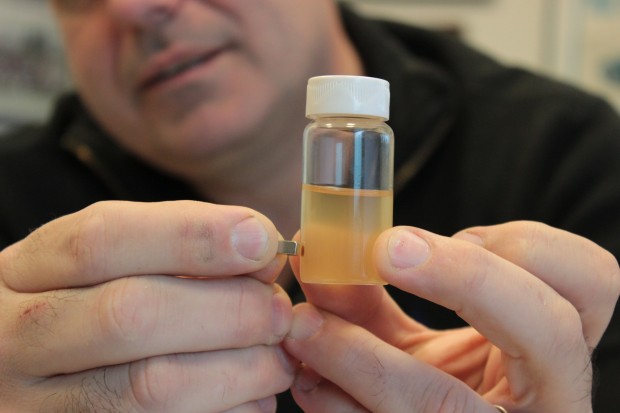Tracing the Culprit if Fracking Pollutes Water Supplies

Dave Fehling / StateImpact
"Nano rust" collects where a magnet is held to vial of water mixed with the tracer
Scientists are developing ways to add non-toxic tracers to drilling fluid so if groundwater is contaminated, investigators would be able to pinpoint if an oil or gas drilling operation was to blame.
“What’s impossible at the moment is if you’ve got multiple companies in an area and it’s thought there is contamination, there is no way to tell which company caused the contamination,” said Andrew Barron at Rice University in Houston.

Dave Fehling / StateImpact
Andrew Barron at Rice University in Houston
Barron is developing (along with colleagues at the University of Alberta) “nano-rust,” an iron oxide that could be injected into the ground along with drilling fluid.
“We’ve designed these particles such that we can fingerprint them based on their magnetism,” Barron told StateImpact.
Should groundwater become contaminated, a magnet would collect the particles from the water and their magnetic “fingerprint” could be compared to tracers added to drilling fluid used in the area.
Drilling DNA
Similar research is underway by a group of Duke University graduates in Raleigh, North Carolina. But the key material for the tracer they’re developing is made of synthetic DNA.
“Because DNA is able to be detected at very low concentrations, we only need a thimble-full amount for detection in the millions of gallons that go into a frack job,” says Justine Chow, one of the young founders of BaseTrace.

Courtesy BaseTrace
Justine Chow at BaseTrace in Raleigh, NC
“We’d have basically a DNA fingerprint for each well. We’d be able to distinguish easily where contamination, if any, is coming from,” Chow told StateImpact.
The scientists for both projects have yet to test their tracers in a real well but hope to in coming months.
Potential Evidence in Pollution Cases
There have been dozens of lawsuits filed nationwide alleging that the drilling technique called hydraulic fracturing, or “fracking,” has harmed the environment. But many have been tossed out of court.
Proving a definitive link between groundwater contamination and fracking — which injects millions of gallons of a solution of water, sand and chemicals deep into the ground — has been elusive in Texas. Just last week, a controversy heated up again over natural gas found in well water in North Texas. Some residents in Parker County had contended it was caused by drilling operations nearby.
At first, the U.S. Environmental Protection Agency agreed. But state drilling regulators at the Texas Railroad Commission disagreed, saying that data indicated the natural gas was not from deeply drilled wells but from shallow deposits of gas that had supposedly been seeping into local well water for years.
The EPA backed off. But now, an Associated Press article suggests the federal agency may have had evidence that drilling was to blame but succumbed to pressure by the drilling company.
What Would Drillers Do?
In theory, having tracers injected at the time of drilling might offer a way to settle such controversies. The drilling industry says it’s not afraid of what tracers might show because it contends fracking is safe.
“If there is something that can help with public perception, I’m sure our folks would be happy to look into it,” said Deb Hastings, executive vice president of the Texas Oil and Gas Association.
There have been proposals in the Texas legislature to make tracers mandatory. But Barclay Nicholson, a Houston lawyer who defends drilling companies and has a blog on fracking, said the tracers may be putting the cart before the horse.
“I worry that we’re going to layer on more regulation, more expense on industry for a problem that to date, we haven’t seen any proof put on at the courthouse that this hydraulic fracking is linked to groundwater contamination,” Nicholson told StateImpact.
